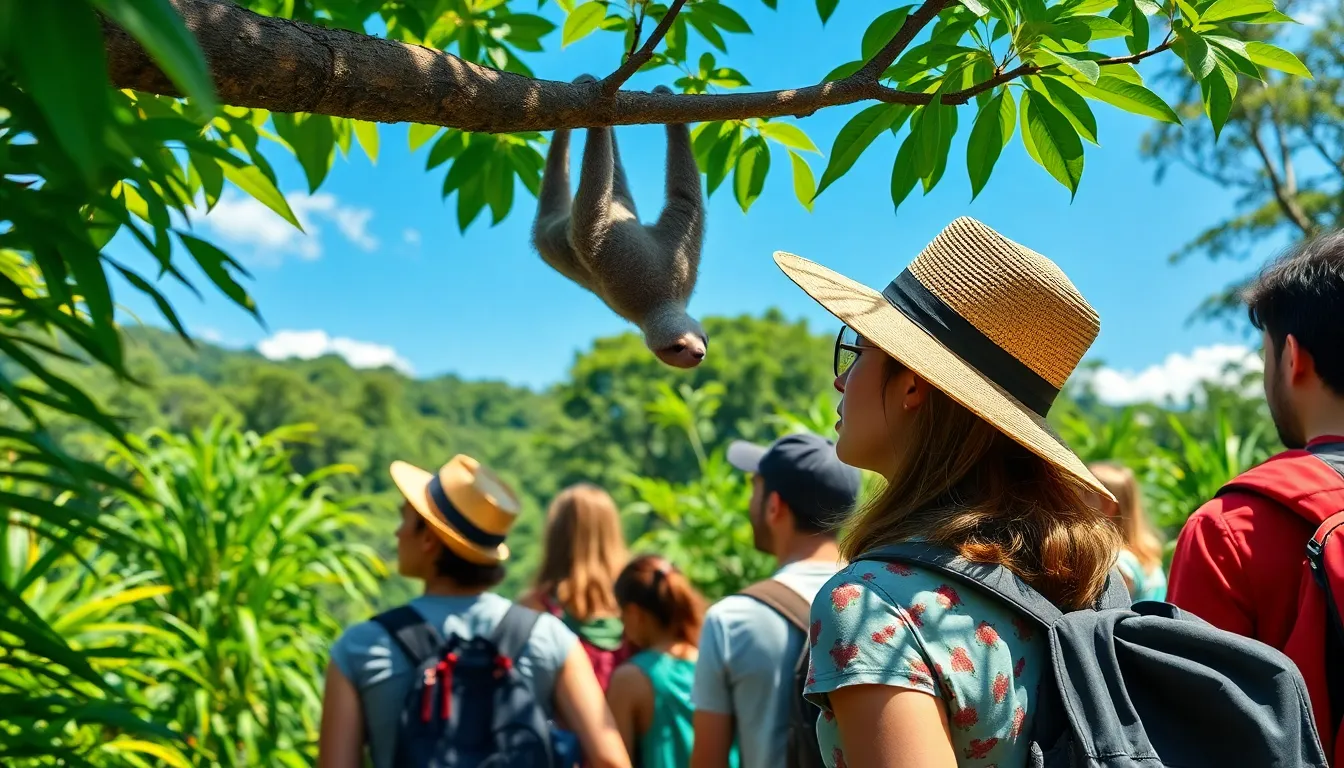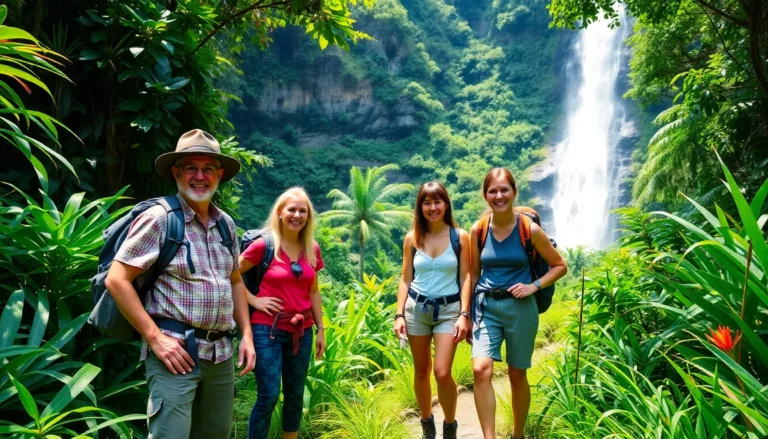Imagine sipping a coconut on a pristine beach while a friendly dolphin does the backstroke nearby. Eco-tourism isn’t just a trend; it’s a passport to adventure that leaves a lighter footprint on our planet. Travelers are trading crowded resorts for lush rainforests, vibrant coral reefs, and wildlife encounters that’ll make their Instagram followers green with envy.
Eco Tourism Destinations
Eco-tourism blends adventure with environmental consciousness, leading travelers to breathtaking places. Two standout categories include tropical rainforests and coastal conservation areas.
Tropical Rainforests
Tropical rainforests, rich in biodiversity, entice nature lovers with their unique ecosystems. Countries like Costa Rica and Brazil offer guided tours through lush canopies where visitors encounter vibrant wildlife, from howler monkeys to countless bird species. These areas prioritize conservation, enabling sustainable practices that protect habitats while providing authentic experiences. Education plays a key role in these destinations, as local guides share insights about the delicate balance of these ecosystems. Travelers often discover new plant species and learn about traditional uses by indigenous communities.
Coastal Conservation Areas
Coastal conservation areas protect vital marine ecosystems and provide stunning vistas. The Great Barrier Reef in Australia showcases vibrant coral formations, where divers explore underwater life such as colorful fish and sea turtles. In Belize, the Barrier Reef Reserve System emphasizes sustainable fishing and habitat protection for aquatic species. Marine protected areas promote ecological health while inviting travelers to participate in responsible snorkeling and kayaking tours. Tour operators foster community involvement, ensuring that tourism benefits both visitors and local residents. Each coastal destination underscores the importance of preserving marine environments for future generations.
Unique Features of Eco Tourism

Eco-tourism features numerous characteristics that distinguish it from traditional travel, emphasizing sustainability and conservation. Engaging with local cultures while preserving the environment is vital.
Sustainable Practices
Sustainable practices form the backbone of eco-tourism. Operators implement measures like using renewable energy sources, minimizing waste, and sourcing local materials for accommodations. Tourists participate in conservation efforts, from reforestation projects to marine life protection. Local communities benefit through increased economic opportunities created by eco-friendly activities. Transparent practices ensure visitors grasp their impact on the ecosystem. Educational programs contribute by informing travelers about environmental issues. These initiatives promote responsible behaviors that enhance the overall eco-tourism experience.
Wildlife Experiences
Wildlife experiences highlight the essence of eco-tourism. Visitors see species in their natural habitats, fostering deeper appreciation for biodiversity. Guided tours provide insights into animal behavior and habitat preservation. Travelers may encounter unique wildlife, such as sloths in Costa Rica or kangaroos in Australia. Participating in monitoring programs allows tourists to contribute directly to conservation. Ethical interactions, minimizing disturbance to animals, create a more immersive experience. Nature reserves and national parks often host these encounters, ensuring protection for vulnerable species. Additionally, partnerships with conservation organizations elevate awareness of the critical need to protect the environment.
Activities to Enjoy in Eco Tourism Destinations
Eco-tourism offers a range of activities that connect travelers with nature and local communities while promoting sustainability.
Hiking and Nature Walks
Hiking trails wind through diverse landscapes, ranging from tropical rainforests to mountainous regions. Nature walks provide intimate glimpses of wildlife, with opportunities to observe birds and other animals in their natural habitats. Guided treks enhance the experience, as knowledgeable local guides share insights about flora, fauna, and ecosystem conservation. Travelers often find themselves immersed in breathtaking scenery, fostering a deeper appreciation for environmental protection. Combining physical activity with education, these outdoor experiences enrich visitors’ understanding of the ecosystems they explore.
Community Engagement
Engaging with local communities enhances the eco-tourism experience significantly. Visitors can participate in cultural exchanges, learning about traditional practices, local cuisine, and artisanship. Workshops run by community members often involve crafts, cooking, or agricultural practices, providing firsthand knowledge of sustainable living. Community-led initiatives promote conservation while benefiting locals economically. Tourists contribute directly to the areas they visit, supporting local projects and fostering goodwill. Immersing in these interactions allows travelers to make meaningful connections, deepening the overall impact of their eco-friendly adventures.
Benefits of Eco Tourism
Eco-tourism provides numerous advantages for travelers and local communities alike. Environmental conservation serves as a cornerstone of eco-tourism, helping protect natural habitats and endangered species. Travelers contribute to preserving ecosystems by visiting protected areas and supporting sustainable practices.
Economic growth emerges as another significant benefit. Local economies thrive when tourists spend money on eco-friendly lodges, guided tours, and local crafts. Communities gain financial stability through eco-tourism initiatives, which often reinvest profits into conservation efforts.
Cultural exchange enhances the travel experience. Tourists engage with local cultures through immersive activities, such as cooking classes and traditional crafts. Increased understanding fosters respect and appreciation for diverse lifestyles and traditions.
Consciousness of responsible travel practices leads to improved awareness. Tourists learn the importance of reducing waste, using renewable resources, and minimizing their ecological footprint. Empowering visitors with knowledge encourages them to become advocates for sustainable practices even after they return home.
Health benefits also arise from eco-tourism. Spending time in nature reduces stress and promotes overall well-being. Outdoor activities like hiking and kayaking improve physical fitness while connecting individuals to the natural world.
Wildlife education plays a vital role too. Engaging with local fauna in their natural habitats provides an opportunity for profound insights into biodiversity and conservation challenges. Observing animals in the wild cultivates a sense of responsibility toward protecting these species.
Overall, eco-tourism delivers a meaningful way to explore the planet while positively impacting the environment and local populations. Communities flourish, ecosystems thrive, and travelers leave with enriched memories and a deeper connection to nature.
Conclusion
Eco-tourism offers a refreshing alternative to conventional travel by prioritizing sustainability and community engagement. As travelers seek authentic experiences that connect them with nature and local cultures, eco-tourism destinations stand out for their commitment to environmental preservation.
By choosing eco-friendly options, tourists not only enjoy breathtaking landscapes and unique wildlife encounters but also contribute to the well-being of local economies. These journeys foster a deeper appreciation for the planet and inspire responsible travel practices that extend beyond the trip. Embracing eco-tourism leads to memorable adventures while making a positive impact on the world.




